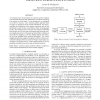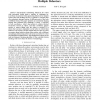1428 search results - page 13 / 286 » Affective scene generation |
UM
2007
Springer
14 years 3 months ago
2007
Springer
Accurately recognizing users’ affective states could contribute to more productive and enjoyable interactions, particularly for task-oriented learning environments. In addition t...
ICASSP
2011
IEEE
13 years 1 months ago
2011
IEEE
An essential step in the generation of expressive speech synthesis is the automatic detection and classification of emotions most likely to be present in textual input. At last I...
ICPR
2008
IEEE
14 years 11 months ago
2008
IEEE
This paper proposes a free-viewpoint imaging method that can be used in a complicated scene such as an office room by using sparsely located cameras. In our method, a free-viewpoi...
CEC
2009
IEEE
14 years 4 months ago
2009
IEEE
— Automatically synthesizing behaviors for robots with articulated bodies poses a number of challenges beyond those encountered when generating behaviors for simpler agents. One ...
MM
2005
ACM
14 years 3 months ago
2005
ACM
We propose a multi-sensor affect recognition system and evaluate it on the challenging task of classifying interest (or disinterest) in children trying to solve an educational pu...


